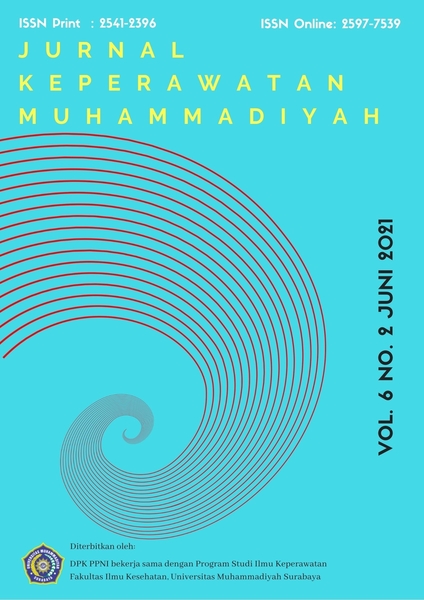Pengaruh Self-Efficacy Enhancing Intervention Program (SEEIP) Secara Online Terhadap Self-Efficacy Dalam Manajemen Diri Penderita Diabetes Mellitus Tipe II Di Puskesmas Juli I
DOI:
https://doi.org/10.30651/jkm.v6i2.7747Keywords:
Type 2 Diabetes Mellitus, Self-Efficacy, Diabetes Self- ManagementAbstract
Objective: The objective of this study was to determine the effect of Self-Efficacy Enhancing Intervention Program (SEEIP) with online method on Self-Efficacy in Self-Management in Type 2 Diabetes Mellitus (T2DM) at Juli I Public Health Centre
Methods: This study was a pre-experimental pre-test and post-test with only one group design. The population wasT2DM at Juli I Public Health Center in 2020. The sample size was 22 participants, selected by purposive sampling technique. Diabetes Management Self-Efficacy Scale (DMSES) was used to measure the Self-Efficacy in Self- Management of T2DM patients. Data were analyzed using paired t-test
Results:Â The results of the study showed that the means score of Self- Management of T2DM before receiving SEEIP was 39,00 (SD: 15,455) and 90,23 (SD: 7,571)after receiving the SEEIP. Paired t-test showed that there was a significant difference on Self- Efficacy in Self-Management in T2DM at Juli I Public Health Centre in 2020
Conclusion: Â SEEIP could improve self-efficacy in self-management for Type 2 diabetes mellitus at Juli I Public Health Centre.
References
Ahmad Sharoni, S. K., Abdul Rahman, H., Minhat, H. S., Shariff-Ghazali, S., & Azman Ong, M. H. (2018). The effects of self-efficacy enhancing program on foot self-care behaviour of older adults with diabetes: A randomised controlled trial in elderly care facility, Peninsular Malaysia. PloS one, 13(3), e0192417. https://doi.org/10.1371/journal.pone.0192417
Albikawi, F. Z., & Abuadas, M. (2015). Diabetes Self Care Management Behaviors among Jordanian Type Two Diabetes. American International Journal of Contemporary Research, 5(3), 87–95.
Bandura, A. (2012). On the functional properties of perceived self-efficacy revisited. Journal of Management, 38(1), 9–44. https://doi.org/10.1177/0149206311410606
Chen, W. C., Lee, C. C., Chien, M. N., Liu, S. C., Wang, C. H., & Yang, W. S. (2018). Blood Glucose Management of Type 2 Diabetes in the Older People. International Journal of Gerontology, 12(3), 170–174. https://doi.org/10.1016/j.ijge.2018.05.008
Damayanti Santi. (2017). EFEKTIVITAS (SELF-EFFICACY ENHANCEMENT INTERVENTION PROGRAM (SEEIP) TERHADAP EFIKASI DIRI MANAJEMEN DIABETES MELLITUS TIPE 2 Santi Damayanti *). Jurnal Keperawatan Respati Yogyakarta, 4(2), 148–153. http://nursingjurnal.respati.ac.id/index.php/JKRY/index
Direktorat Jenderal Pencegahan dan Pengendalian Penyakit. (2019). Buku Pedoman Penyakit Tidak Menular. Kementerian Kesehatan RI, 101. http://p2ptm.kemkes.go.id/uploads/VHcrbkVobjRzUDN3UCs4eUJ0dVBndz09/2019/03/Buku_Pedoman_Manajemen_PTM.pdf
Hussen Ali, Z. (2017). Effect of Self-Efficacy Enhancing Intervention Training on Clinical Health Status of Diabetic Patients at High-Risk for Leg Problems. Journal of Patient Care, 02(01), 1–9. https://doi.org/10.4172/2573-4598.1000111
I D F Diabetes. (2019). 463 PEOPLE LIVING WITH DIABETES million.
Komariah, & Rahayu, S. (2020). Oral Dengan Gula Darah Puasa Pada Pasien Diabetes Melitus Tipe 2 Di Puskesmas Baturraden. Dm, 41–50.
Novianti, D., Indriyawati, N., & Setyonegoro, S. A. (2019). Efektivitas Diabetes Self Management Education Dan Community Based Interactive Approach Terhadap Self Care Penderita Diabetes Mellitus. Jendela Nursing Journal, 3(1), 1. https://doi.org/10.31983/jnj.v3i1.4453
Riskesdas, K. (2018). Hasil Utama Riset Kesehata Dasar (RISKESDAS). Journal of Physics A: Mathematical and Theoretical, 44(8), 1–200. https://doi.org/10.1088/1751-8113/44/8/085201
Siregar, R., Stongpat, S., & Wattanakul, B. (2018). Increasing Self-Efficacy To Regulate Exercise in Adult Patients With Type 2 Diabetes Mellitus. Belitung Nursing Journal, 4(6), 596–601. https://doi.org/10.33546/bnj.586
Sulistyowati, L. (2017). Kebijakan Pengendalian DM di Indonesia. Simposium WDD, 121–130.
Susanti, S., & Bistara, D. N. (2018). Hubungan Pola Makan Dengan Kadar Gula Darah Pada Penderita Diabetes Mellitus. Jurnal Kesehatan Vokasional, 3(1), 29. https://doi.org/10.22146/jkesvo.34080
Downloads
Published
Issue
Section
License
- Penulis tetap memegang hak atas karyanya dan memberikan hak publikasi pertama kepada jurnal ini yang secara simultan karya tersebut dilisensikan di bawah:Â Creative Commons Attribution-ShareAlike 4.0 International (CC BY-SA 4.0)













